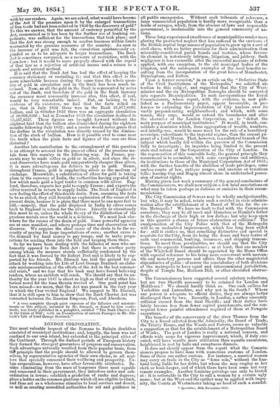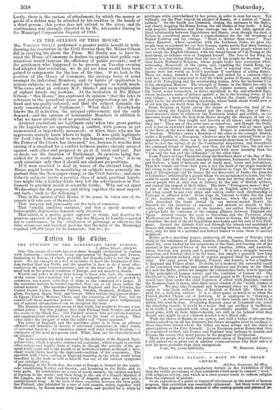LONDON CORPORATION.
THE most valuable bequest of the Romans to Britain doubtless consisted of municipal institutions; and, happily, the boon was not confined to our own island, but extended to the principal cities of the Continent Through the darkest periods of European history they formed the strongest guarantees of progress and conservation. Such advantages naturally resulted from their popular basis, from tht principle that the people should be allowed to govern them- selves, by representative agencies of their own choice, in all mat- ters that specially concerned their wellbeing and prosperity. Ur- ban corporations, however, have other favourable attributes. Be- sides eliminating from the mass of burgesses those most capable and concerned in their government, they introduce order and sub- ordination in towns; establish a gradation of ranks and degrees ; place a ladder on the common platform which all are eligible to climb, and thus act as a wholesome stimulus to local services and desert, as well as creating accredited authorities for aid and guidance in all public emergencies. Without such tribunals of reference, a large unassociated population is hardly more recognizable than a
horde of savages, which, from the absence of laws and responsible government, is inadmissible into the general community of na- tions.
These long-experienced excellences of municipalities render more glaring the protracted neglect that has suffered in the environs of the British capital large masses of population to grow up in a sort of civil chaos, with no better provision for their administration than miserably-constituted parish boards and vestries, whose favour- ite element is notoriously intrigue, litigation, and jobbery. Such negligence is less excusable after the successful measure of reform applied, with one exception, to the old municipal bodies of the kingdom, and the subsequent examples of the local benefits re- sulting from the incorporation of the great hives of Manchester, Birmingham, and Bolton. Upon a former occasion,* in an article on the "Defective State of the Civil Institutions of the Metropolis," we solicited at- tention to this subject, and suggested that the City of West- minster and the six Metropolitan Boroughs should be converted into separate Municipalities. To such incorporations the Royal Commissioners, whose report, with the evidence, is now pub- lished as a Parliamentary paper, appear favourable, in pre- ference to extending the jurisdiction of City nucleus over its vastly preponderating neighbourhood ; and which, with some reason, they urge, would so extend the boundaries and alter the character of the London Corporation, as to "defeat the main purpose of municipal institutions." It would, in truth, con- solidate a dominion which, from aggregation of wealth, numbers, and intelligence, would be more meet for the rule of a hereditary sovereign, subordinate to the imperial regime, than the annual pa- geant of a Lord Mayor. That, however, is a collateral branch of the subject which hardly fell within the purview of the Commission fully to investigate ; its inquiries being limited to the present state and reform of the Corporation of the City of London. In the regeneration of this venerable body, the general principle they recommend is to assimilate, with some exceptions and additions, its institutions to those of the Municipal Corporation Act of 1835; with the further benefits of the abolition of trade privileges, some useless courts of law, antique usages, and onerous or vexatious tolls; leaving (log and Magog almost alone in undisturbed posses- sion of ancient rights. Having given last week a summary of the general conclusions of the Commissioners, we shall now subjoin a few brief annotations on what may be taken perhaps as dubious or omissive in their recom- mendations.
The City Commission of Sewers may be wholly unobjectionable, but why, it may be asked, retain such a crotchet in civic adminis- tration after the establishment of a Board of Works for the en- tire Metropolis ? 'We have no fault to find with the Commission ourselves ; they may be all meek and blameless as Hamlet's father in the discharge of their high or low duties ; but why keep open in this quarter a chance of future obstruction or collision ? The amalgamation of the City Police with that of the Metropolis will be an undoubted improvement, which has long been called for : still it strikes us, that something distinctive and special is requisite for the City, from its being the dense and busy centre of such vast commercial, banking, insurance, and shipping transac- tions. To meet these peculiarities, we should say that the City requires its separate Commissioner ; or at least, that one member of the Whitehall Board should be appointed by the Home Office with especial reference to his being more conversant with mercan- tile and monetary persons and affairs than the other magisterial stipendiaries of police : of course the constabulary of both divisions of the metropolis to have equal and intercommunal jurisdiction, despite of Temple Bar, Holborn Hill, or other cherished obstruc- tion.
The Commissioners have suggested several salutary reductions, but are two Sheriffs necessary to be retained for London and Middlesex ? We should hardly think so. One each sat:ices for Yorkshire and Lancashire, and why not in the South ? Where one person is adequate to official duties, they are always better discharged than by two. Recently, in London, a rather unseemly collision ensued from the dual Sheriffs; and their duties have lately become less from fewer capital punishments, and the con- sequent fewer painful attendances required of them at Newgate executions.
The transfer of the conservancy of the river Thames from the City to a Board selected from the Admiralty, the Board of Trade, the Trinity House, and the Woods and Forests, seems as valuable a suggestion as that for the establishment of a Metropolitan Board of Works. The port of London is really a national concern, and affords wide scope for vigorous improvement, which, if duly exe- cuted, will have results more utilitarian than aquatic excursions, heightened in zest by balls and sumptuous dinners. It does not clearly appear from the report what the Commis- sioners propose to have done with numerous customs of London. Some of these are rather curious. For instance, a married woman may carry on trade in the City as " feme sole," without the hus- band being liable for her debts, but whom she may employ as her clerk or book-keeper, and of which there have been some not very remote examples. Another feminine privilege can only be hinted at : it is actionable in the City to call a woman by a certain ugly name ; but at the West-end the epithet may be applied with impu- nity, the Courts at Westminster taking no heed of such a scandal.
Spectator, 30th November 1850.
Lastly, there is the custom of attachment, by which the money or goods of a debtor may be attached by his creditor in the hands of a third person : this power does not extend to the river, and its continuance was strongly objected to by Mr. Alexander Baring in the Municipal Corporation Inquiry of 1834.



























 Previous page
Previous page